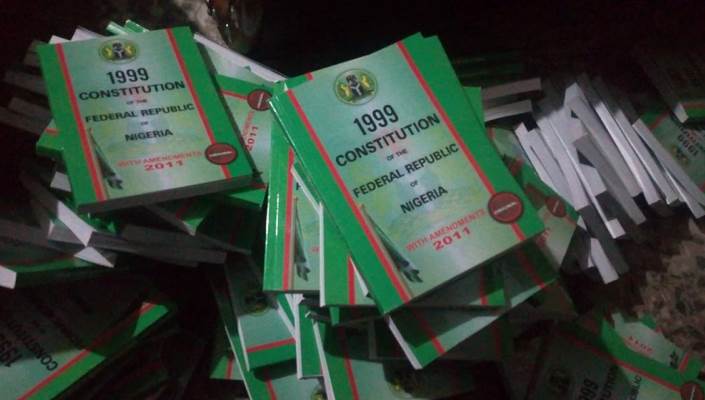Constitution Review: Will Lawmakers Meet the December Deadline?
The clock is ticking for Nigeria’s 10th National Assembly as it races against time to deliver the first set of amendments to the 1999 Constitution before December 2025.
Despite Jibrin Barau, the Deputy President of the Senate’s assurance of the legislature’s commitment to a people-centered and timely review, questions persist about whether lawmakers can realistically meet the deadline, especially with most of the amendment bills yet to pass second reading in the Senate.
At a two-day joint retreat of the Senate and House of Representatives Committees on the Review of the 1999 Constitution in Lagos, Senator Barau, who chairs the Senate Committee on Constitution Review, underscored the urgency and importance of the assignment.
He described the constitutional review process as a “national duty that must be approached with patriotism, focus, and sincerity of purpose.”
“It has been a long journey to bring the Senate and the House of Representatives’ Constitution amendment proposals that cut across several sections and deal with different subject matters,” Barau said.
“We have been in this process for the past two years, engaging our constituents, critical stakeholders, institutions, civil society organizations, and interest groups in town hall meetings, interactive sessions, and public hearings, harvesting and synthesizing views and perspectives which have culminated in what we have here today.”
The retreat is expected to consider 69 bills, 55 state creation requests, two boundary adjustments, and 278 local government creation requests, all seeking alterations to the 1999 Constitution.
However, insiders in the National Assembly have expressed concern that the December deadline might be overly ambitious, given the current stage of legislative progress.
As of October, many of the proposed amendment bills were still awaiting second reading, meaning they have not yet advanced to the committee or harmonization stages.
Each amendment, by constitutional requirement, must go through all legislative procedures, from first reading to committee consideration, harmonization between both chambers, and eventual transmission to the 36 State Houses of Assembly for concurrence by at least 24 states.
Read also: Why 25 years of constitutional amendments have failed Nigeria – Agbakoba
This painstaking process has historically slowed down constitutional amendment efforts in Nigeria.
Previous Assemblies have often struggled to conclude such exercises within their four-year tenures.
The 8th National Assembly, for instance, saw several bills lapse at the end of its session, while the 9th Assembly managed to transmit only a limited number of amendments, notably those on judicial reforms and financial autonomy for state legislatures and judiciaries, which took nearly three years to conclude.
Given that background, observers doubt the feasibility of the 10th Assembly’s December target.
It’s said that even if the joint committees complete their retreat and finalize recommendations by November, moving the bills through both chambers, harmonizing differences, and securing state assembly approvals would require a near-impossible legislative sprint.
Yet, Senator Barau remains optimistic.
In his speech, he charged lawmakers to approach the task with “open minds and collective resolve,” stressing that the committee’s work must reflect the aspirations of Nigerians rather than partisan or sectional interests.
“It is not going to be a simple task to achieve within two days, but I believe we can do it,” Barau said.
“We have promised Nigerians that we will deliver the first set of amendments to the State Houses of Assembly before the end of this year.
“ I believe we can deliver on this promise if we engage the bills and the issues with open minds.”
He added that lawmakers must focus on “what best serves the citizens of Nigeria” and avoid “competitive debates or rivalries between the Senate and the House of Representatives.”
Political watchers, however, point out that beyond legislative procedure, political realities could also affect the timeline.
Constitutional amendments often require consensus among diverse political blocs, regional interests, and institutional stakeholders.
Disagreements over issues such as state police, local government autonomy, resource control, and gender inclusion have historically delayed progress.
In this current review cycle, some of the most contentious proposals include the creation of new states, the restructuring of Nigeria’s federal system, and the demand for full local government autonomy, all politically sensitive issues that require broad national agreement.
Moreover, as the National Assembly edges closer to midterm, political distractions are expected to grow, particularly as parties begin positioning for the 2027 general elections.
This could further limit the time and focus needed to see the amendments through.
Read also: House of Representatives to hold national public hearing on constitution review September 22
Despite these challenges, the leadership of the Constitution Review Committee insists that the current process is better structured than in previous Assemblies.
Lawmakers have adopted a phased approach, intending to send the first batch of “non-contentious amendments” to the states before December, while the more complex issues will follow in subsequent rounds.
This strategy, could help the legislature achieve partial success by meeting its self-imposed December deadline, even if only a fraction of the proposed bills make it through in the first phase.
Barau, who also serves as the First Deputy Speaker of the ECOWAS Parliament, reinforced this optimism, urging lawmakers to see the assignment as an opportunity to strengthen Nigeria’s democracy.
“We are seated here as one committee. There should be no ‘we’ and ‘them.’ We should be guided solely by the interests of Nigerians,” he said.
Still, many Nigerians are watching closely, not just to see if lawmakers meet the deadline, but whether the amendments will truly address long-standing governance gaps.
For citizens weary of stalled reforms, constitutional review efforts often feel like déjà vu: grand promises that rarely translate into structural change.
As the National Assembly deliberates, the December deadline stands as both a target and a test of legislative will, coordination, and sincerity.
Whether or not the lawmakers meet it, the coming weeks will determine if this round of constitutional amendment marks a turning point or merely another cycle of legislative ambition and unfinished reform.

